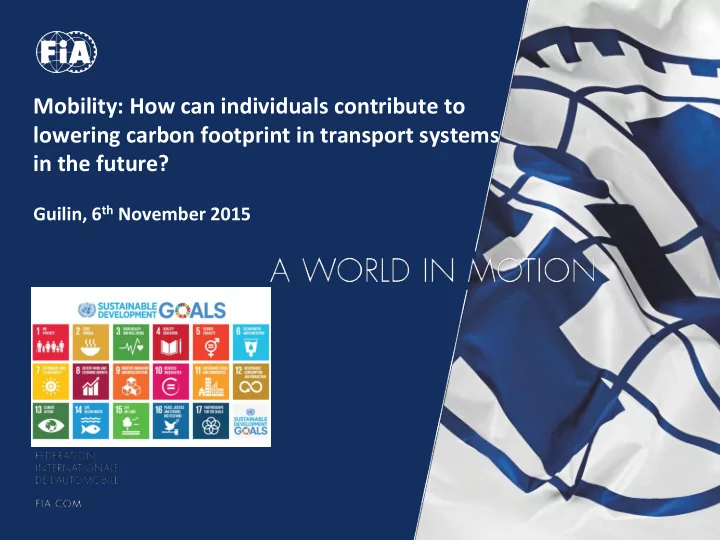

Mobility: How can individuals contribute to lowering carbon footprint in transport systems in the future? Guilin, 6 th November 2015
THE FIA • International association of national Automobile and Touring Clubs and national Federations for motoring and motor sport. • It brings together 236 national motoring and sporting organisations • from 141 countries on five continents • Its member clubs represent 80 millions of motorists • Enjoys a consultative status with the United Nations. SPORT MOBILITY Mission : ensures that fair, capably Mission : ensure that safe, affordable and regulated and above all safe events are clean systems of transport are available conducted in all corners of the globe. to all. 2
LOWERING A CARBON FOOTPRINT: A CONSUMER’s PERSPECTIVE • Consumers can contribute and play a crucial role in defining consumption patterns and everyone needs to think about ways to influence mass behaviour and social norms to promote low-carbon, healthier urban lifestyles. • When consumers are put in a position to embrace low carbon technology, then public policy, technological progress, and market success will be mutually reinforcing. 3
ENGAGING WITH CONSUMENRS Set the right Information set of Driving & structural Innovation educational policies programmes 4
STRUCTURAL POLICIES • Countries looking at • Before deciding the • Countries that have • Governments should this approach should specific target, robust not adopted fuel design fuel taxation make sure that new cost-benefit analysis economy or policies ensuring that should be developed regulation will not greenhouse gas there is transparency increase the level of upfront, ensuring emission standards for consumers, taxation for affordability for (which require a great maximise the consumers: demand consumers and large deal of knowledge) potential for for fuel among up-take in the market. may find feebates a behavioral change motorists is relatively inelastic, so any • A multi-stakeholder • A feebate program is increase in fuel price • Fiscal policy should consultation process a “transfer”, not a only leads to a small be technology-neutral should also be “tax”. Those who decrease in and results-oriented promoted to agree on choose to buy higher consumption. and should be the most appropriate CO2 emitting • The new value designed in a way path vehicles pay fees, created by these that result in which are used to carbon price affordable vehicles to give rebates to those mechanisms, for the consumer at large who buy lower examples, can be emitting vehicles used to reduce the tax burden and/or earmarked to sustainable mobility strategies FISCAL FUEL ECONOMY INCENTIVES, MARKET-BASED FUEL TAXES AND STANDARD and INCLUSING FISCAL POLICES MEASURES REGULATION FEEBATES
DRIVING INNOVATION • Affordable solutions in the market • Ensure high deployment in the fleet. • Ecodriving as no-cost measure • ITS support • Implement shared mobility solutions EcoDriving tecniques EcoDriving Coaching & Support Start & stop technology Car Sharing schemes 6
INNOVATION & EDUCATION • Promote measures to inform and educate people to choose the most efficient products on the market; • Create demonstration events to bring technology to the consumers; • Consider CO2 labelling schemes; • Support independent assessment programmes. 7
8
Recommend
More recommend